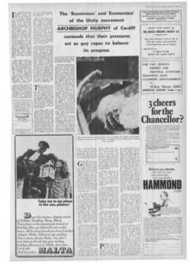Page 2, 20th January 1967
Page 2

Report an error
Noticed an error on this page?If you've noticed an error in this article please click here to report it.
Tags
Share
Related articles
Pope's Call To Tshombe For Peace In Congo
Give New
The Pope Has Worked From The Very First Day Of His...
Vatican
By Desmond O'grady Any Peace Arrangements In The Middle East
The Pope to ! Intensify Peace efforts
THIS YEAR will undoubtedly see a steady stepping-up of Pope Paul's efforts for world peace and a corresponding intensification of the Vatican's role in international diplomacy. He recently expressed his willingness to intercede with Communist China in the cause of peace. He opened the New Year by telling world diplomats accredited to the Holy See that the Church could not support violent revolution as a means of remedying society's ills. On the contrary, he said, the Church sought the way to peace through negotiations and mutual agreements.
Pope Paul is expected to receive Mr. Nikolay Podgorny, the Russian President, who is due in Rome on January 24, in private audience. Even if this is an unofficial visit, it will add great significance to the Pope's campaign for good will among all men, world peace and religious freedom in Communist bloc countries.
Early in the year, Mr. Harold Wilson acknowledged the Pope's pre-eminent position in international peace moves by sending him a message announcing the British Government's initiatives aimed at bringing peace to South-East Asia. Pope Paul replied immediately. He had frequently deplored the persisting hostilities in Vietnam, he said, and had recently invited all concerned to end the "terrible war" and to work together not only for the well-being of the Vietnamese people, but all mankind, threatened as it was by the continuation of hostilities. He also congratulated Mr. Wilson on Britain's "humane and enlightened gesture". The first Catholic functionary to visit North Vietnam since the Communists took over in 1954, Mgr. Georg Huessler, general secretary of the West German branch of Caritas, the international welfare organisation, is now on his way home. He visited Hanoi primarily on a mercy mission—to find out what medical supplies his organisation could send to the North Vietnamese. But he was also charged by the Vatican to contact Catholic Church leaders there.
Pope Paul himself is anxiously awaiting Mgr. Huessler's report. He misses no chances whatsoever of keeping in touch, directly or indirectly, with the Vietnam situation. He is likely to travel abroad again this year. Wherever he goes, it will be first and foremost in the cause of international peace and understanding.
"Time is precious and short," he told a vast crowd assembled in St. Peter's Square. "We must make the best possible use of it. The two great ideals for which to work and pray are also the world's two greatest problems—justice and peace."
'Optimistic' film report
FILMS SHOWN IN ITALY in 1966 showed the "lowest degree of immorality" since 1961, reports the Italian Catholic Cinema Centre. Of 451 Italian and foreign films reviewed, 66 were judged "objectionable" and 48 were "excluded" as unsuitable for everyone. These 114 represented
25 per cent of all films exhibited in Italy in 1966, compared with 31 per cent condemned in 1965. Of the 48 "excluded", 26 were Italian. None was American.
The Vatican newspaper 0.sua-valore Romano, says the centre's "optimistic" report is mitigated by the fact that a high percentage of films judged not entirely negative from the Catholic moral viewpoint had been totally deficient in artistic quality. This meant many of the films had "warranted the dismal comment 'a harmless but idiotic picture' ".
While a large number of films had not been considered harmful. they had nothing good to offer, as rervatore Romano adds. "They did not help man to understand himself or the world around him. Nor did they help him to live and hope".
Osservatore Romano says that the so-called "excluded" films, despite their decrease compared with previous years, "had been filled with a degree of immorality bordering on crime. Themes of sex and violence continue to dominate Italian and foreign films. while works of true social. religious, political and cultural meaning are still absolutely marginal".
The Catholic Cinema Centre works with the Italian episcopate. Its findings are not binding on Italian Catholics, but are published to guide them in selecting their film enter . tainment.
Italians and the Church
ALTHOUGH 98 per cent of Italians officially record themselves as Catholics. only 35 per cent of them attend Mass on Sundays or holy days of obligation. Of this 35 per cent, 57 per cent are women and barely eight to nine per cent of them take Holy Communion.
Other statistics revealed at a convention in Rome of Italian parish priests showed that out of every 100 children haptised. not more than 80 were subsequently confirmed and only 85 made their first communion. Of all Italians baptised. 92 per cent are married in Church and 90 per cent are buried with Church rites.
There arc 26,644 parishes in Italy, each with an average of 2,000 inhabitants. Sixty per cent of the parishes are in large towns or industrial districts. Every Saturday, 20 per cent of the parishioners leave their homes to spend the weekend elsewhere, which means they are out of their own parish on Sunday, the one day on which they might be in contact with the church.
In the last 80 years, Italy's secular clergy have dropped by half. In 1881, there were 84,000 diocesan priests. one to every 270 people. In 1966, there were 42.000 priests, one to every 1,245 people. During the same period, the population doubled.
The distinguished Jesuit, Fr. Roberto Tucci, editor of tilt Jesuit review Civilia Canaolica, says that. viewed away fron the cold light of figures and percentages, the Italian people an not atheists. nor are they wholly detached from the Church For too long. he adds, the Italian clergy have been conten with too little from their parishioners; with a type of reli giosity often too close to superstition and founded on th people's ignorance of the true reasons for faith.
In other words. the Italians have nothing against tf Church and certainly nothing against God, but they certain! act as if they do not believe in hell and what the Churc teaches about it. They see to it that their children are baptist and Make their first communion and that they marry , church as their parents did. Most of them want a proof church funeral, too. But beyond these things, their co.,.ac with the Church "are by no means as regular as they shoul be".
Thanks from Florence
THE STOUT-HEARTED Mayor of Florence, Professor Piero Bargellini, 69, accompanied Cardinal Ermenegildo Florit, his Archbishop. to an audience with Pope Paul. at which they thanked the Holy Father for his Christmas visit to the flOod-stricken city and his contributions to the aid fund.
The Pope, in turn, commended the leaders and all Florentines for the way they had stood up to their ordeal and were now working for the city's rehabilitation.
Prof. Bargellini has been awardedthe Golden Heart, a yearly prize offered by the nation to the 10 top Italians who have shown the greatest charity and self-sacrifice towards their fellow citizens.
ALAN McELWAIN
blog comments powered by Disqus











